Key takeaways:
- Choose a fulfillment partner that aligns with your brand’s vision and values to ensure effective communication and minimize miscommunication.
- Thoroughly evaluate a partner’s technology, integration capabilities, and customer service to avoid operational hiccups and ensure a smooth working relationship.
- Establish clear performance metrics and maintain proactive accountability to foster transparency and strengthen the partnership over time.
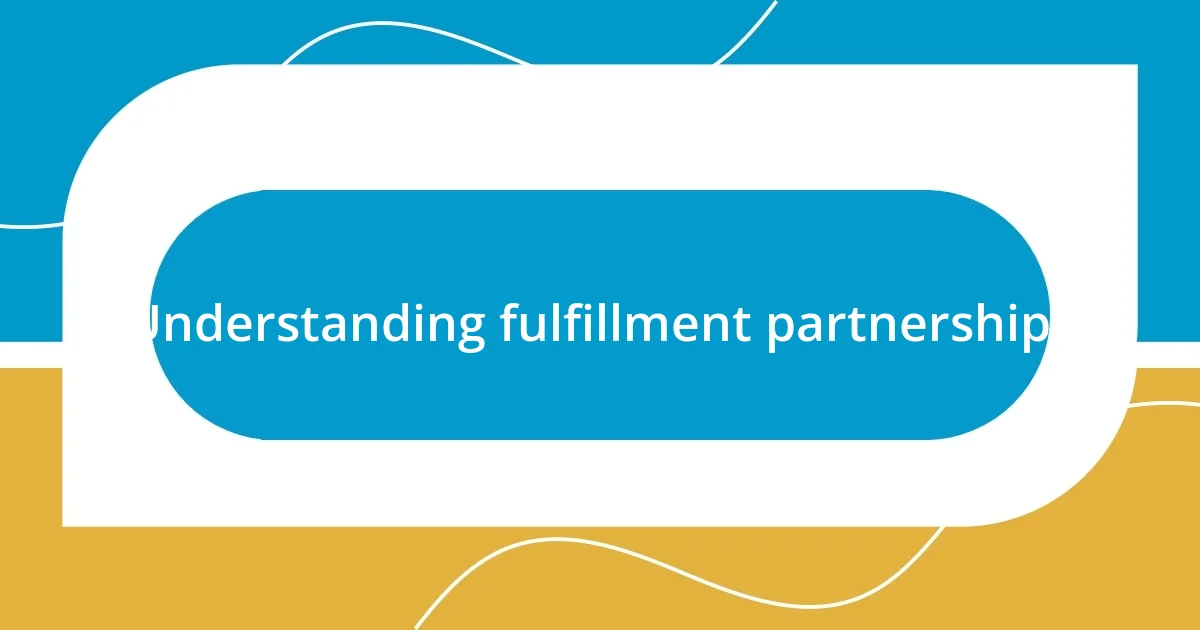
Understanding fulfillment partnerships
Fulfillment partnerships can seem daunting at first, but they are essential in scaling a business. I remember my initial experience when I partnered with a fulfillment company; it felt like stepping into uncharted territory. I wondered, “Will this partnership really elevate my business?” The answer, in my case, was a resounding yes.
These partnerships go beyond mere logistics; they encompass trust and shared objectives. I often found myself reflecting on the importance of communication with my partner. After all, how can you collaborate effectively if you’re not on the same page? It’s crucial to assess not just capabilities but also cultural fit.
Your fulfillment partner should complement your vision and values. I learned this the hard way when a previous partner didn’t align with my brand’s mission, causing miscommunication and delays. It taught me that understanding each other’s priorities makes all the difference. Have you ever felt that disconnect? It can be a frustrating experience that highlights the need for a strong, supportive partnership.
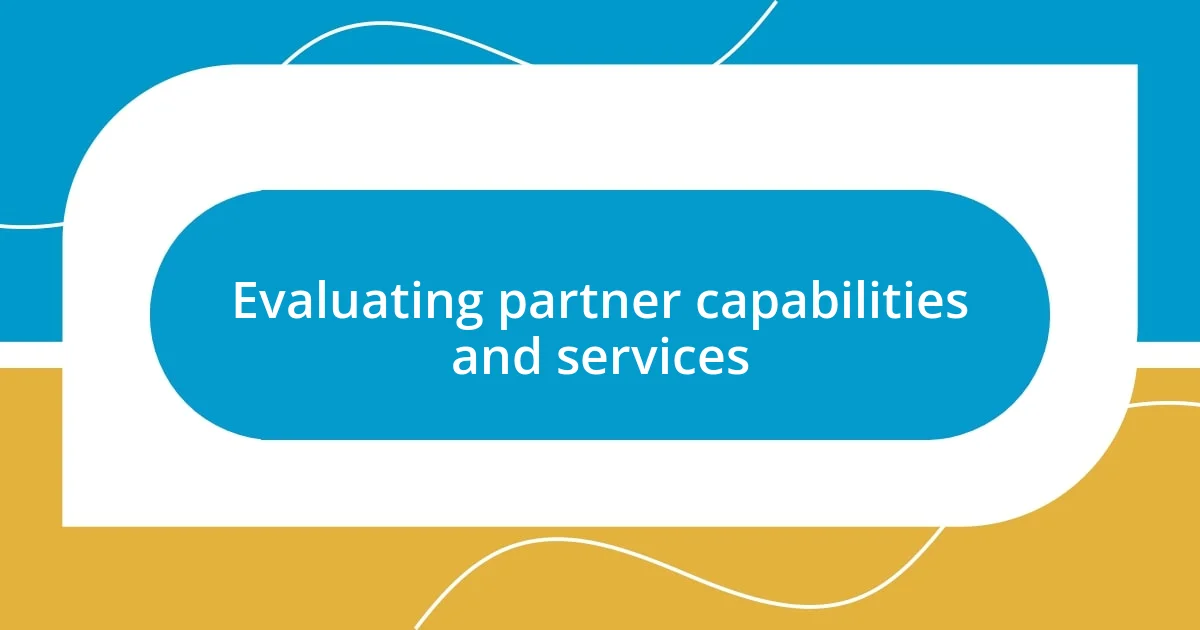
Evaluating partner capabilities and services
Evaluating potential fulfillment partners requires a deep dive into their capabilities and services. During my journey, I discovered that not all providers offer the same level of support. Some may have cutting-edge technology while others focus on customer service. It’s essential to find a balance that aligns with your specific needs.
When assessing potential partners, consider the following:
- Technology Integration: What systems do they use for inventory management and order fulfillment?
- Scalability: Can they adapt to your growth, whether that’s seasonal spikes or business expansion?
- Shipping Options: What carriers do they work with, and are there multiple shipping speed options?
- Customer Support: Is their support staff readily available to help with issues, and how quickly do they respond?
- Track Record: Do they have testimonials or case studies showcasing successful partnerships?
In my case, I once overlooked a partner’s shipping options. I quickly realized the limitations during a peak sales season when my customers faced delayed deliveries. This experience taught me just how integral proper assessment is; it was a lesson that definitely stayed with me.
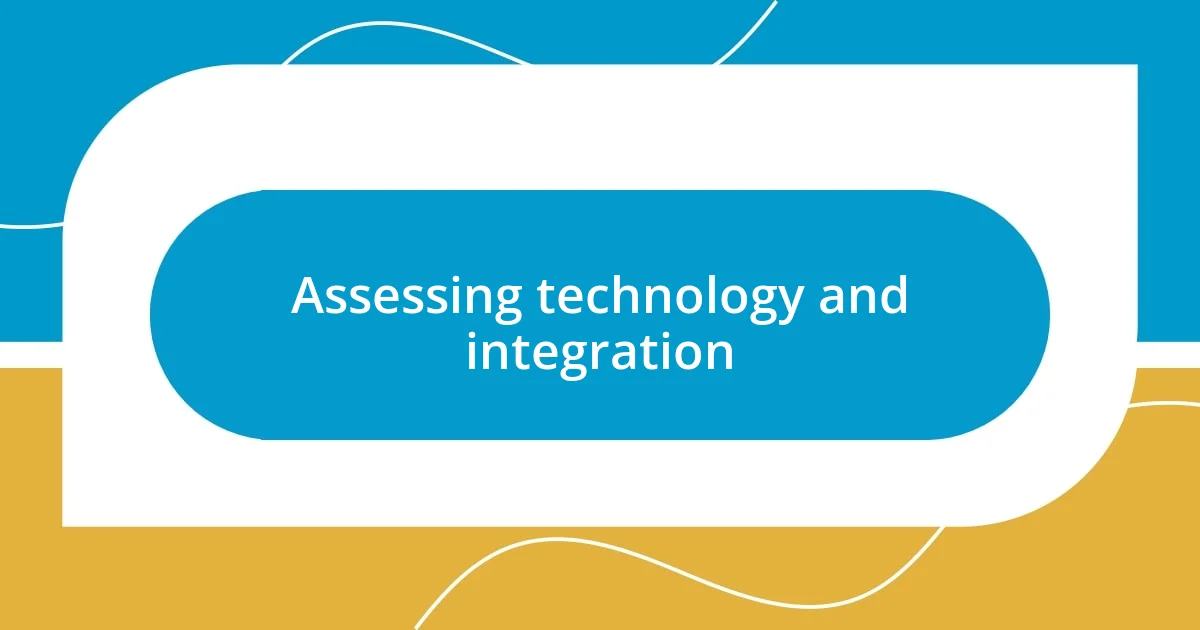
Assessing technology and integration
Assessing the technology and integration capabilities of a fulfillment partner should be a priority. I remember a particular partnership where I assumed that a well-known company would have superior technology. However, their outdated inventory management system caused significant hiccups in order accuracy. It became clear to me that the tools they used were just as important as their reputation. So, I urge you to look for partners whose technology aligns with your operational needs.
Integration is another crucial aspect. Does the fulfillment partner facilitate smooth connections with your e-commerce platforms? When I worked with a partner that didn’t support seamless integration, my orders were often delayed, leading to dissatisfied customers. That taught me a painful lesson about the importance of having a tech-savvy partner who can adapt to your systems. It’s like dating; you don’t want to get too far into a relationship only to find out you operate on different wavelengths.
In my experience, evaluating technology isn’t just about features; it’s also about user experience. A partner with a confusing interface can lead to frustrating daily operations. I vividly recall feeling lost on their dashboard, which wasted precious time I could’ve spent focusing on growth. It’s essential to choose someone whose technology not only works but is approachable and efficient for your team.
| Criteria | Considerations |
|---|---|
| Technology Level | Check for modern systems that enhance efficiency, such as automated inventory tracking. |
| Integration Capability | Ensure they can easily connect with your existing e-commerce platforms. |
| User Interface | Look for user-friendly designs to minimize training time and operational hiccups. |
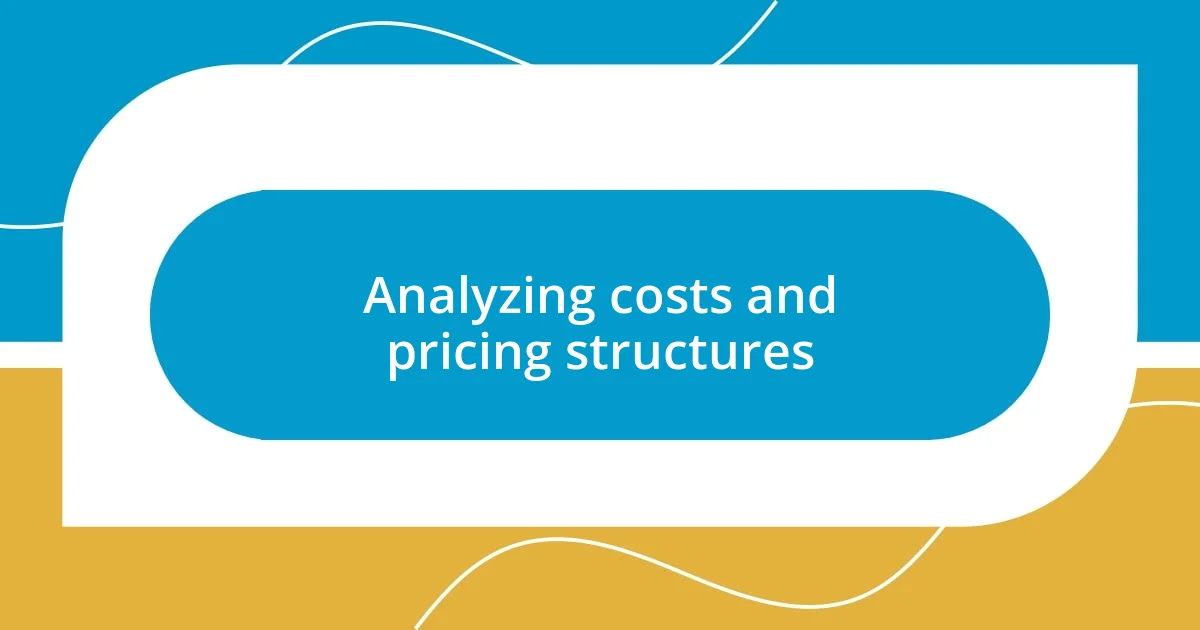
Analyzing costs and pricing structures
When it comes to analyzing costs and pricing structures for a fulfillment partner, I believe transparency is key. I’ve encountered situations where partners presented a tantalizingly low base price but hit me with hidden fees later. For instance, I was blindsided by an unexpected storage fee during a busy season, which significantly cut into my margins. This experience taught me to break down the numbers—understanding every aspect of the pricing structure can save you from nasty surprises.
It’s also important to consider how pricing models align with your business model. Some partners charge per order, while others may have a monthly fee structure. I recall trying out an order-per-transaction partner, only to feel the pinch as my order volume increased. This pricing model felt like a double-edged sword; it seemed affordable at first, but the costs quickly escalated and made me reevaluate my choice. Understanding your projections and growth can steer you toward a pricing model that grows sustainably with your business.
And let’s not overlook the value for money. I’ve learned that sometimes, the cheapest option isn’t the best long-term investment. I once went for a low-cost partner that ended up compromising on delivery speeds and customer service. This not only affected my customers’ satisfaction but also hampered my business’s reputation. It got me thinking—what’s more important: saving a few bucks or ensuring your customers have a stellar experience? Evaluating the cost versus value can lead to stronger, more efficient partnerships.
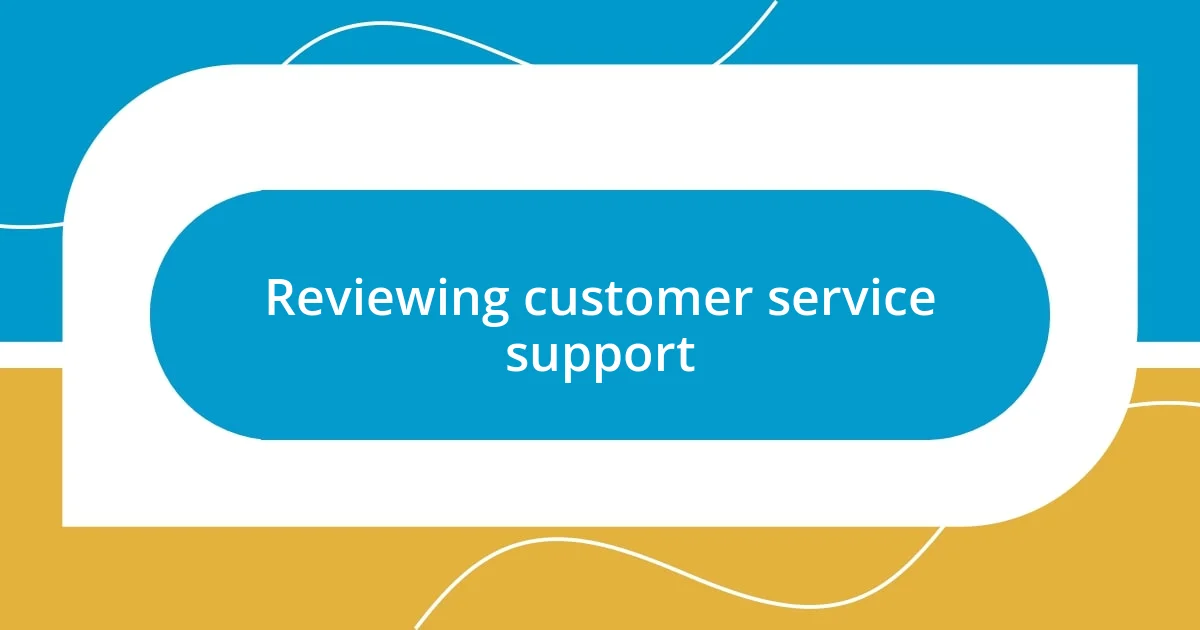
Reviewing customer service support
When reviewing customer service support, I often reflect on moments when I reached out for help and really needed a timely response. There was a time when an unexpected spike in orders caught me off guard. My fulfillment partner’s support team was swamped, and I felt like my questions were lost in a black hole. The delayed responses not only created stress for me but also left my customers anxious about their orders. Reliable customer service can make or break your relationship with a fulfillment partner.
I firmly believe that effective communication is crucial in customer service support. I’ve had partners that offered multiple channels for support—like live chat, email, and phone. However, I learned the hard way that just being available isn’t enough. If the representatives aren’t well-trained or knowledgeable, it’s like talking to a brick wall. I remember one incident where I spent over an hour on hold only to receive incomplete answers that left me more confused. It really highlighted for me the importance of having representatives who are not just accessible but also experts in their field.
Lastly, I can’t stress enough the impact of proactive support. A fulfillment partner that anticipates your needs and reaches out before you even ask for help shows a level of commitment that can greatly enhance your experience. For example, I once worked with a partner who noticed a pattern in my order volumes and suggested a preemptive solution that saved us both a lot of headaches. Their initiative made me feel valued and understood, reinforcing why quality customer service should be a top consideration when choosing a fulfillment partner. Isn’t it reassuring to work with a team that genuinely has your back?
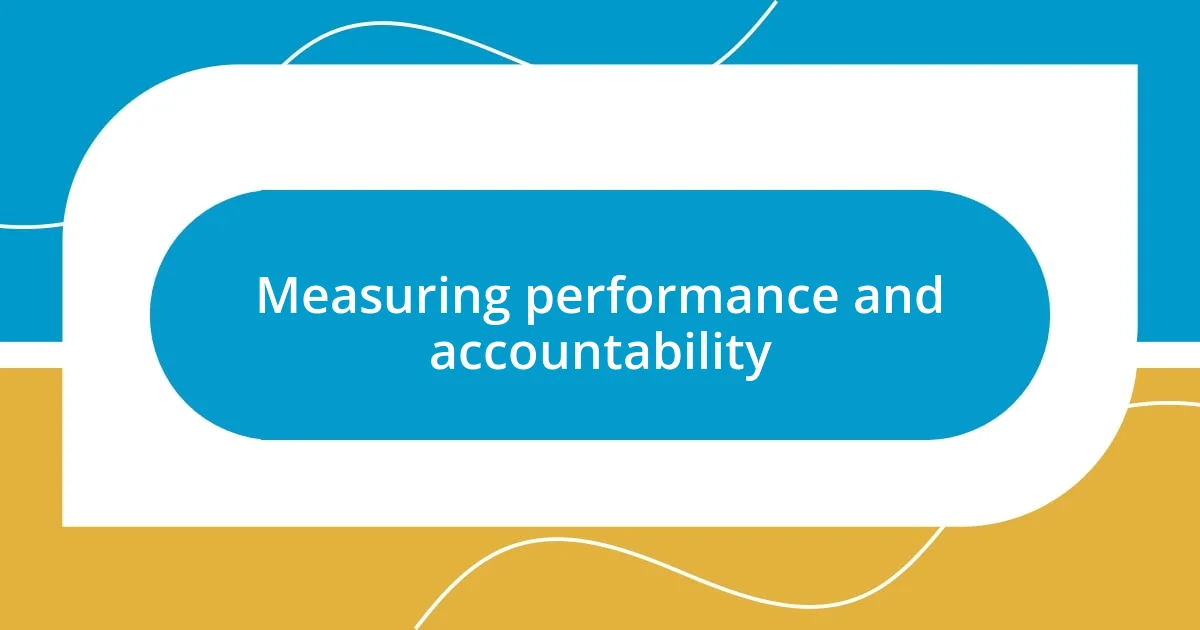
Measuring performance and accountability
Measuring performance and accountability is vital in any partnership, especially when it comes to fulfillment. I’ve found that setting clear metrics from the get-go is essential. For instance, when I partnered with a fulfillment company, we established key performance indicators (KPIs) like order accuracy and shipping times. This mutual understanding made it easier to hold each other accountable; I knew what to expect, and they were aware that their performance directly impacted my business’s success.
It’s not just about having metrics in place; it’s also about regular check-ins to assess these performance indicators. I once scheduled monthly reviews with a partner, and honestly, it transformed our relationship. We discussed the numbers, but we also dived into the ‘why’ behind the metrics. Why were shipping times fluctuating? What could we do together to improve? These conversations fostered a sense of teamwork and accountability, and it showed me how committed they were to my success.
Additionally, I learned the hard way that being reactive is not enough; proactive accountability is crucial. There was a moment when a shipment delay hit us unexpectedly. Instead of waiting for me to discover the issue, my fulfillment partner reached out first, explaining what happened and outlining a plan to rectify it. That kind of transparency and initiative made me feel valued and reassured me that I made the right choice in my partner. Have you ever experienced that sense of trust when your partner steps up without you needing to ask? It’s a game-changer in establishing not just metrics but meaningful partnerships.













